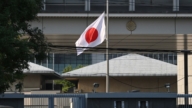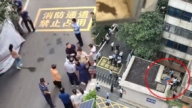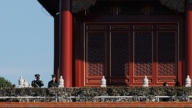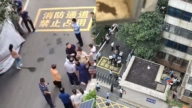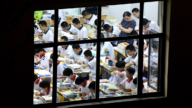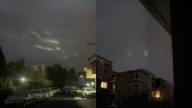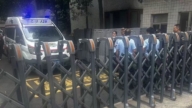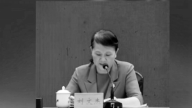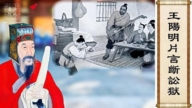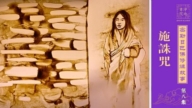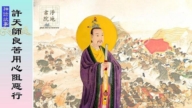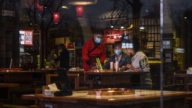【新唐人2011年7月8日讯】中国当代最有代表性的底层作家廖亦武,著作无数,他的作品被翻译成英、法、日、德等多种文字出版,在国际上有相当知名度,不过,多年来他的作品在中国始终被禁。因六四诗歌《大屠杀》入狱四年的他,把愤怒和苦难化为力量,从此蜕变成一名悲天悯人的底层作家。
廖亦武曾经是激情奔放的现代诗人,1990年的一场牢狱之灾后,他开始用最愤怒的笔触完成作品《证词》,这本书即将在德国出版,是描述廖亦武在监狱中,如何饱受国家机器对他的虐待和对他人格的侮辱。现在他又被当局限制出境,想前往德国为新书宣传的想法也只好做罢。
廖亦武向《德国之声》表示:“有一种改变就是我心态上面的改变。我以前就是把这些当成我承受不了的一些东西,我觉得我愤怒,我觉得我特别特别的苦难,我觉得不公平。但是现在,反过来头来,我把这一切(苦难)都当作我的老师。”
四年的牢狱生活让廖亦武开始走进群众。
《世界华人周刊》报导,廖亦武写作题材多来自一些社会边缘群体,像是小偷、农民工、流浪汉、妓女以及上访群体等,先后完成作品《活下去》、《中国底层访谈录》、《中国冤案录》、《中国上访村》、《最后的地主》数卷。美国耶鲁大学康正果教授为《地震疯人院——四川大地震记事》写序文时称他是“掏粪者”,专掏社会的阴暗面。
《德国之声》报导中提到,廖亦武的作品虽然都是描述生活在社会底层的弱势族群,涉及的话题也都是中国丑恶、肮脏、不和谐的一面。但是他从来不对时事发表评论,所以他始终不认为自己是“政治作家”。
在中国,想要看到廖亦武的出版品并不容易,因为大部分作品都被查禁,他本人也多次被关押和抄家。幸运的话,或许在坊间可以找到他的手印本。
廖亦武:“对于西方人来说很正常的一些事情,比如出版,一个作家写作的权力,这些很正常,但是在中国就要一步一步的去争取。就像一个门缝一样,你要把它越挤越开。比如说我现在还会去争取正常的出版权利,如果正常出版不了,我就退而求其次,我就自己把它印出来。虽然这种读者群(小),不会有很多的人读到我的东西,但总会有人他会读到,我影响一个人就算一个人。”
廖亦武现年52岁,曾于1995年和2003年两度获得美国赫尔曼•哈米特写作奖;2002年获《倾向》文学奖;2007年获独立中文笔会“自由写作奖”。《底层》英译本《THE CORPSE WALKER(赶尸者)》,由兰登书屋出版并畅销。美国权威文学杂志《巴黎评论》连续4次推出他的专辑,使他逐步进入了西方主流文学界。廖亦武另一本《上帝是红色的》英文版也将在美国面世。
新唐人记者李庭、黎安安综合报导。
Political writer Liao Yiwu
Liao Yiwu is the most representative of
contemporary Chinese writers from the lower class.
He is well-known internationally and
his works have been translated into other languages.
However, his works have been banned in China.
He was jailed for 4 years for his poem “Massacre”,
which commemorates the victims perished in 1989.
Liao Yiwu used to be a passionate contemporary poet.
After being imprisoned in 1990,
he began writing a book titled “Testimonials,”
which is about to be published in Germany.
This book describes Liao’s experiences in prison and
how the state machine tortured and abused him.
Since now he is forbidden to leave China,
he cannot travel to Germany to promote his book.
Liao told Deutsche Welle, “My mentality has changed.
I used to consider this as something I can’t bear.
I was furious. I thought that I suffered a lot
and that I was mistreated.
Now, I see all the suffering as my teacher.”
Four years of imprisonment propelled Liao
to get close to the people.
World Chinese Weekly reported that the themes of
Liao’s works are usually about marginalized groups,
such as thieves, migrant workers, the homeless,
prostitutes and petitioners.
His completed works include “The Survivor”,
“Interviews with the Lower Strata of Chinese Society”,
“China Unjust Court Cases”, “China’s Petitioner Villages”
and “The Last of China’s Landlords”.
In the preface to “Earthquake Insane Asylum”,
Yale University’s Kang Zhengguo called Liao a
“Dung Digger,” always digging the dark side of society.
Deutsche Welle pointed out that while Liao’s works
always portray the vulnerable groups in China
and about the ugly and the dirty sides of China,
he never comments on China’s current affairs,
so he never consider himself a “political writer.”
In China, it’s very hard to see Liao’s published works,
as most of his works are banned. Liao was detained
many times, and his properties have been confiscated.
If you are lucky, you might find a hand printed copy.
Liao, “Some things normal in western countries,
such as the right to write and publish,
need to be obtained by hard work in China.
I will fight for my right to publish books.
If I cannot succeed, I will print the books on my own.
While I don’t have many readers,
someone will read my books, and become influenced.
Liao, 52, received Hellman-Hammett Award in 1995 and 2003,
the Qingxiang literature award in 2002,
and Independent Chinese PEN Center’s
Freedom to Write Award in 2007.
“The Corpse Walker” was published by Random
House and sold very well.
The U.S literary magazine “Paris Review” published
his works in four consecutive issues,
introducing him to the western mainstream literature.
The English version of another book of Liao,
“God is Red”, will be released in the U.S.
NTD Reporters Li Ting and Li Anan


